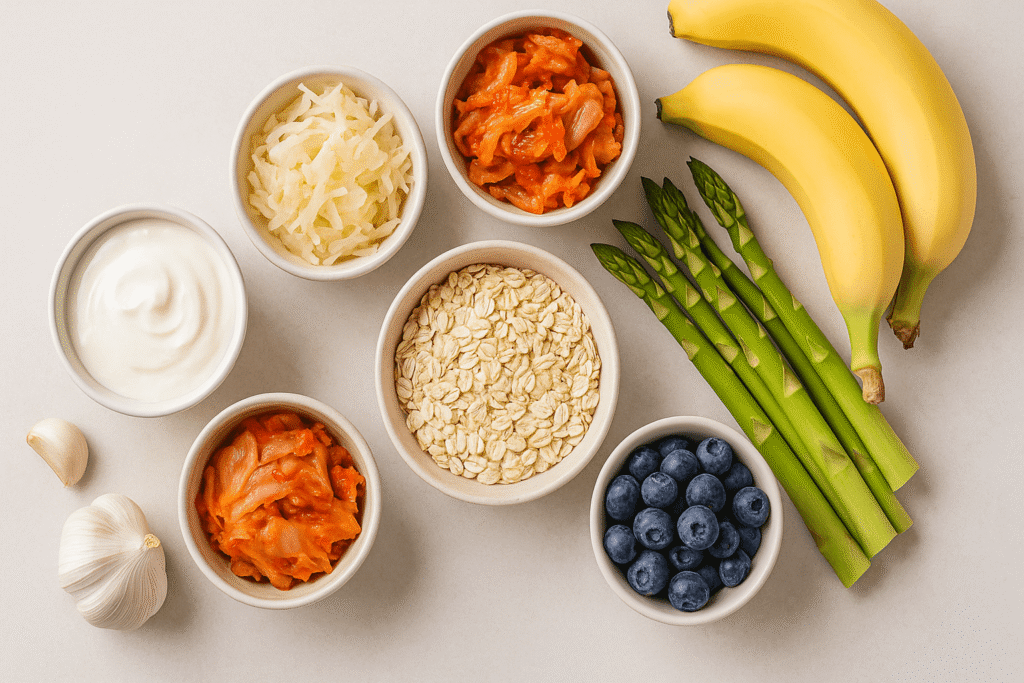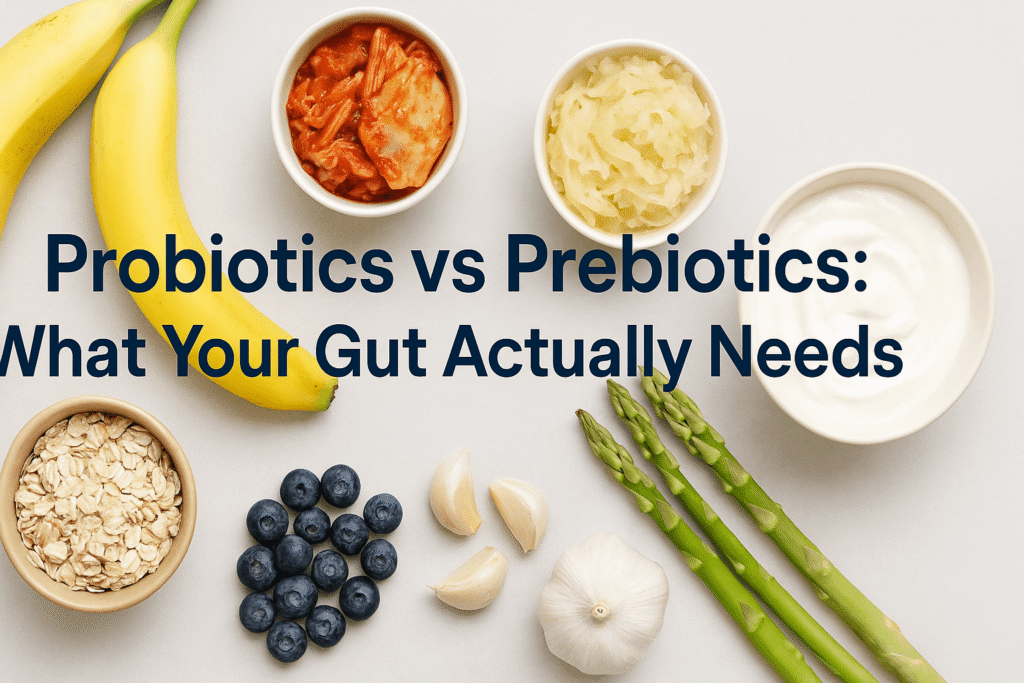Introduction
If you’ve heard that “your gut is your second brain,” you’ve probably also heard about probiotics and prebiotics. They sound similar, but they play different roles. In short: probiotics are the beneficial bacteria, while prebiotics are the fibers that feed them. Understanding both (and how to get them from food) is one of the simplest ways to support digestion, energy, and even more stable blood sugar throughout the day.

Probiotics: The Helpers
What they are: Live, beneficial microbes that add to your gut community.
Why they matter: A diverse microbiome helps with digestion, nutrient absorption, immune balance, and may support calmer moods and steadier energy.
Top food sources:
- Yogurt with live cultures (look for “live & active cultures”)
- Kefir
- Sauerkraut and kimchi (unpasteurized/refrigerated)
- Miso and tempeh
- Kombucha (unsweetened or low-sugar)
Quick tip: Heat can kill live cultures. Add fermented foods at the end of cooking or enjoy them cold.
Prebiotics: The Food for Your Microbes
What they are: Non-digestible fibers (and some polyphenols) that your gut microbes ferment into beneficial compounds.
Why they matter: Feeding good bacteria helps them produce short-chain fatty acids (SCFAs) like butyrate, which support the gut lining and metabolic health.
Top food sources:
- Garlic, onions, leeks, chives
- Asparagus, artichokes (especially Jerusalem artichokes)
- Bananas (slightly green), apples, pears
- Oats, barley, cooked-and-cooled rice or potatoes (resistant starch)
- Beans, lentils, chickpeas
- Ground flaxseed, chia seeds
- Berries and cocoa (rich in polyphenols)
Do You Need Supplements?
Food first, always. Many people do well simply by adding 1–2 servings of fermented foods and 25–35 g of fiber daily. Supplements can help in specific cases, but quality varies. If you’re considering a probiotic:
- Choose a product listing strain(s), CFU count, and “best by” date.
- Start low and note changes for 1–2 weeks.
- If you have immune issues or take medications, consult your clinician before starting.
A Simple 7-Day Gut-Friendly Plan
Goal: Add one fermented food and one prebiotic source each day—without overhauling your life.
Daily anchor:
- Breakfast: Oats (or high-fiber cereal) + chia/flax + berries.
- Hydration: Water or unsweetened tea; keep soda/juices minimal.
Rotate these add-ins through the week:
- Fermented (pick 1/day): yogurt, kefir, sauerkraut, kimchi, miso soup, tempeh, kombucha (small glass).
- Prebiotic (pick 1–2/day): garlic/onions/leeks in cooking; greenish banana; apple; beans/lentils; asparagus; cooked-and-cooled potatoes/rice; barley.
Example day:
- Breakfast: Overnight oats + chia + blueberries.
- Lunch: Lentil salad with cherry tomatoes, parsley, olive oil, lemon.
- Snack: Apple with peanut butter.
- Dinner: Stir-fry with tempeh, onions, garlic, and asparagus; side of brown rice (cook, cool, and reheat).
- Optional: Small glass of kombucha.
Common Mistakes (and Easy Fixes)
- Jumping to high fiber overnight → bloating. Increase gradually and drink water.
- Sugary yogurt/kombucha. Pick unsweetened or low-sugar options.
- Cooking fermented foods too hot. Add after cooking to keep cultures alive.
- Fiber without fluids. Aim for 6–8 cups of water daily.
Who Should Be Cautious?
- People with SIBO, active IBD flares, or on immunosuppressants should consult a clinician before adding fermented foods or probiotic supplements.
- If you notice persistent discomfort, scale back and reintroduce more slowly.
Quick FAQ
Are pickles probiotics? Only if naturally fermented and refrigerated (not vinegar-only shelf pickles).
Can I get too many probiotics? Food sources are generally safe; supplements can cause gas/bloating—reduce dose or switch strains.
Is fiber powder enough? It can help, but variety of whole-food fibers tends to work best.

David Thompson is a certified personal trainer and lifestyle coach with more than 12 years of experience. He helps busy adults create simple, effective workout routines that fit into everyday life. David believes that fitness should be approachable and motivating, not overwhelming.

